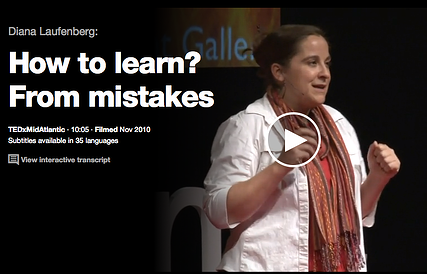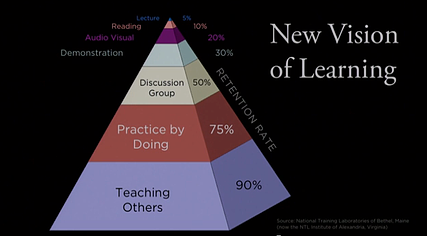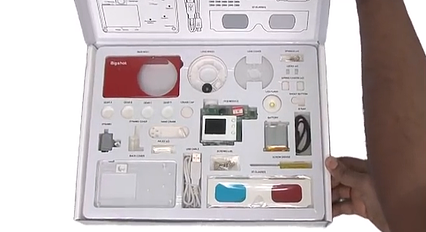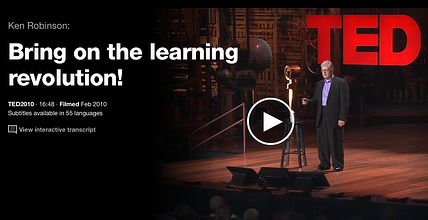Service-learning and experiential learning can transform the way students absorb information by integrating real-world experiences with classroom lessons. Check out these TEDx talks that explore how service-learning is helping students understand social issues and empowering them to take action.
-
How to Learn? From Mistakes— Diana Laufenberg
November 2011 at TEDxMidAtlantic

“If we continue to look at education as if it's about coming to school to get the information and not about experiential learning, empowering student voice and embracing failure, we're missing the mark.”
Diana Laufenberg describes how projects that challenged her students to use what they learned in class to create and interact with the world were the most fruitful parts of their learning. She describes assignments that she gives students, forcing them to interact with the world as a way of absorbing classroom topics. In all of these assignments, Laufenberg emphasized the importance of allowing students to make and learn from mistakes as a powerful method of learning.
- Secrets of engagement based learning— Gever Tulley
September 2012 at TEDxBratislava
“Create a meaningful experience, and the learning will follow”
Gever Tulley focuses on how education should be redesigned to create experiences rather than curriculum. In Tulley’s school, Brightworks in San Francisco, children learn by creating. He outlines an experiential learning process: exploring ideas in the real world, creatively expressing their new knowledge, and sharing their learning with others.
- 3 rules to spark learning— Ramsey Musallam
April 2013
Ramsey Musallam is a high school science teacher who believes the role of educators is to spark creativity and inquiry in their students. He advocates for integrating technology into education to facilitate question-driven rather than content-driven learning. In his talk, he outlines three rules for educators: curiosity comes first, embrace the mess, and practice reflection. The learning process is nonlinear, and constant adaptation to students’ needs is necessary. By following these three rules, educators fulfill the purpose of teaching: cultivating curiosity, inquiry, and imagination.
- Service and schools -- partnership on purpose— Jim Kielsmeier
August 2013 at TEDxFargo
"Meaning and purpose in one's life is not something that's given. It's earned. It's something that comes through significant service and contribution."
Jim Kielsmeier is the Founder and President/CEO of the National Youth Leadership Council, and founder of the Center for Experiential Education and Service-Learning. He talks about the history of service in American culture, and his work today bringing service to education. He has dedicated his life to trying to figure out how to make service a ubiquitous part of growing up. Kielsmeier describes service-learning as “a new way of thinking about young people.” Encouraging young people to enact positive change in their community in service-learning class settings is the “new way” of thinking about education.
- Kids, Take Charge— Kiran Sethi
November 2009 at TEDIndia
“If learning is embedded in real world context…then children go through a journey of: aware, where they can see the change; enable, be changed; and then empower, lead the change.”
Kiran Sethi is an educator who inspires her students to live by two simple words: “I can.” She does this through a teaching process that incorporates service with learning to show children the empowering quality of knowledge. This style of learning correlates with better performance in school. In her classes, she saw that “when children are empowered, not only do they do good [in the community], they do well [academically].” She believes that teachers should challenge students to be positive change makers. In school, children should go from “the teacher told me to I am doing it.” - The life-long learner— Ben Dunlap
March 2007
“That irrepressible desire to know”
Ben Dunlap shares how several mentors in his life have influenced him as a learner. He emphasizes the importance of being a lifelong learner, of always seizing the moment as one that can be learned from. Learning comes from education, but once a person is finished studying and begins working in the real world, learning continues as an amalgamation of experiences and interactions with the experiences of others. - A camera for experiential learning— Shree Nayar
November 2014 at TEDxColumbiaEngineeringSchool
Shree Nayar talks about a build-it-yourself kit called “Big Shot” to build your own camera. The learner is exposed to all the scientific processes occurring in the camera from how batteries work to LED lights and from pixels to how the LDC screens displays the picture. It also looks into the steps that lead to capturing a picture with a camera. Building this camera often leads to a new interest in science, but also leaves the learner with a fully functional camera to capture moments in his or her life. As Nayar puts it, the product’s greatest asset as a tool for experiential learning is that “it allows you to juxtapose the sciences and the arts in a single learning experience. - Experiential Learning Helps Both Students & Local Businesses— Fernando Padilla
March 2012 at TEDxAshokaU
Fernando Padilla describes how his experiences show that local businesses and schools can partner up to better local economies and students’ education. Students are paired with struggling local businesses and volunteer to help the business become more successful. The local economy is strengthened. The students bring knowledge and in turn get the satisfaction of helping someone. In addition, students gain valuable professional experience and start building networks—both of which will be useful when they begin searching for jobs after finishing school. - The Future of Education without Coercion— Shawn Cornally
June 2011 at TEDxEastPrep
“Lets do something for real. Have them [students] come up with it. Let me help guide them.”
Shawn Cornally proposes a new way of educating students and assessing their performance. He believes the role of the teacher should change from one that give information and tests to one who gives a lesson and then challenges students to create something based on the knowledge they have gained. The teacher acts as a guide for this creative process. Students learn by struggling with the information rather than memorizing it.
- Bring on the learning revolution!— Sir Ken Robinson
February 2010
“And every day, everywhere, our children spread their dreams beneath our feet. And we should tread softly.”
Sir Ken Robinson argues that education reform is not what we need. What we need is an education revolution. The current education system is based on a standardized, industrial system. However, what education should be is one that is personalized to local situations. Education should follow a grassroots, “agricultural system” where each student can flourish in his or her school.
If you're looking to get the most out of experiential learning and service-learning, don't forget to integrate service reflections.





